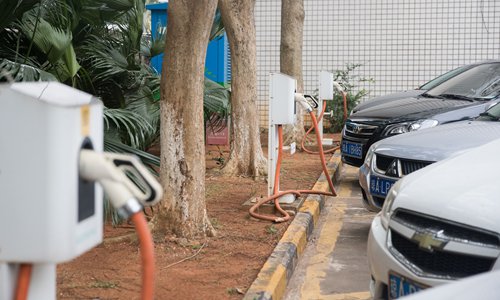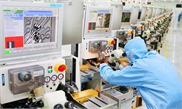
Electric cars park near charging stations in Haikou, South China's Hainan Province. The tropical province issued a plan on Tuesday to boost the development of new-energy cars, vowing to ban the sales of fuel-based cars by 2030. It aims to upgrade its public service vehicle fleet with those powered by clean energy by 2020. Photo: VCG
Chinese electric car start-up Nio is shutting a factory for five days due to the global shortage of semiconductors, the company announced over the weekend. Experts predict that the shortage may extend to other Chinese electric vehicle (EV) makers and last through the third quarter.
The overall supply constraint of semiconductors affected the company's production volume in March, and the company expects to deliver approximately 19,500 vehicles in the first quarter of 2021, adjusted from the previously released outlook of 20,000 to 20,500 vehicles, the announcement said.
Nio was the first of the three Chinese premium EV makers - a group that also includes Xpeng and Li Auto - to announce a production halt. Rival Xpeng has expressed concern over the semiconductor shortfall.
Brian Gu, vice chairman of Xpeng, said earlier in March that the company's chip supplies can last two to three months and in the short term, the chip crunch won't affect its relatively small-scale output. But the company is paying close attention to the chip industry.
For Nio and other EV makers, a product halt may happen again later this year, given the global shortage of car chips, independent automobile car analyst Feng Shiming told the Global Times.
"The chips used by each company are different. Some carmakers are still struggling, and it is a matter of time until major Chinese smart EV companies face production slowdowns this year," he said.
The highly specialized supply chain for chips has suffered from the impact of the coronavirus pandemic and it has been exacerbated by unanticipated disruptions such as the fire at a semiconductor factory in Japan and snow storm in the US.
Since last week, some of the biggest names in the car industry have halted production due to chip shortages, including Hyundai, Honda, Volvo, Ford, Nissan, Toyota, Volkswagen and Mitsubishi.
Cui Dongshu, secretary general of the China Passenger Car Association, told the Global Times that domestic enterprises are striving to increase the production of car chips, and the impact of the chip shortage is expected to be resolved in the third quarter.
"The situation is expected to ease in the third quarter, when it will be the off-season in China's auto market, and factories in Japan and the US should have recovered," Cui said.

